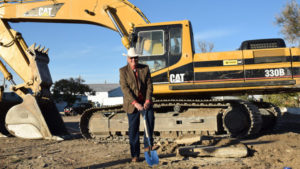ENGLEWOOD, Colo. – On Jake Rishavy’s third day at his new job with the Denver South Economic Development Partnership, his boss, Mike Fitzgerald, walked into his office, dropped a thick binder on his desk, and asked him, “What can we do with this?” The binder contained a 300-page report on the local healthcare industry, which an economist had compiled for the organization.
“Denver South had spent a year prior to my arrival researching trends in healthcare,” explained Rishavy, director of innovation at Denver South. “Healthcare is a major industry in this part of Denver, and we wanted to better understand how we could add value to it.”
Tasked with fostering commercial activity along the stretch of I-25 between I-225 and Lone Tree, Denver South regularly recruits out-of-state companies, works closely with policymakers, and runs a business retention program to ensure the economic vitality of Denver’s southern neighborhoods. But, from time to time, the 35-year-old non-profit also engages in projects of a less traditional kind.
“Economic development as a practice is radically changing right now,” said Rishavy. “What worked five years ago isn’t necessarily going to work in the next five years, and it may not even be working right now.”
After reading the report, Rishavy began meeting with the members of Denver’s startup community to identify the needs of what the report had called the healthcare industry’s emerging “digital health” sector. It was the beginning of a project that would enable Colorado’s health-tech companies to secure millions in funding, forge major partnerships, and establish a statewide health innovation ecosystem.
Building The Ecosystem
“When Jake first approached me, I had just launched Innovation Pavilion after five years of researching entrepreneurial ecosystems around the country,” explained Vic Ahmed, the cofounder of Innovation Pavilion. “From my research, I knew that digital health was trending. But when Jake showed me his report, I saw there was an opportunity to turn this region into a digital health hub.”
In partnership with Innovation Pavilion, Denver South launched the Prime Health Collaborative in early 2012. An attempt to convene Denver’s emerging digital health sector, the Collaborative consisted of monthly meet-ups and an annual summit. Within months, Rishavy and Ahmed had enlisted a team of passionate volunteers that included Pam Peccolo, Kerianne Leffew, Ray Hutchins, and Nim Patel.
“For the next three years, we worked together almost on a daily basis,” said Rishavy. “We realized that no organization had yet convened this industry because it was still nascent, and that the people we were meeting didn’t know one another because they had never been brought together.”
The Collaborative set about remedying this situation, hosting monthly gatherings at Innovation Pavilion that grew from a dozen people to several dozen to nearly a hundred in the organization’s first year. During this time, Dr. Arlen Meyers, president and CEO of the Society of Physician Entrepreneurs, began to help the Prime Health Collaborative build an inventory of local digital health companies.
“We started engaging with the first 25 digital health companies we identified, asking them about their barriers to and opportunities for growth,” said Rishavy. “Our goal from the outset was to connect them with the resources that existed in the community to accelerate their development and encourage job creation.”
By mid-2013, the Collaborative had hosted two Digital Health Summits, and had held meet-ups at Galvanize in downtown Denver, at TechStars in Boulder, and at Innosphere in Fort Collins. As its membership grew, Rishavy began to see an opportunity to turn the Collaborative into a community of national prominence.
“We realized that we needed to be a statewide ecosystem if we were going to compete with Boston and San Francisco,” said Rishavy, referring to the nation’s top two digital health ecosystems according to funding. “Around that time, Jeffrey Nathanson started coming to our meet-ups.”
A long-time healthcare entrepreneur, Nathanson was brought on as a consultant by the Collaborative. Alongside fellow entrepreneur Mike Biselli, he and Rishavy traveled around Colorado in search of new digital health companies. By 2014, the Prime Health Collaborative had become a statewide organization, and Nathanson had been made its president and CEO.
Under his guidance, the Collaborative launched its first Digital Health Challenge, an annual shark-tank style event where health-tech companies pitched pilot opportunities to a panel of healthcare payers and providers. “The Digital Health Challenge was genius in its approach,” admitted Rishavy. “It allowed us to make a more thorough inventory of the companies in our ecosystem, and drove true engagement from large payers and providers.”
Major healthcare organizations took notice, with Kaiser Permanente and Aetna agreeing to sponsor the Collaborative. Inspired by the community the Collaborative had built, Tom Higley, a successful tech entrepreneur, decided to launch 10.10.10 Health, a healthcare-focused venture generator. Convinced the ecosystem needed dedicated office space, Mike Biselli began working on Catalyst HTI. But, amid all of this promising activity, Denver South came to a sobering realization.

Construction began on Catalyst HTI in late 2016.
“It was clear that it was working,” said Mike Fitzgerald, Denver South’s CEO. “But it also became clear that the Collaborative could become much bigger than we had thought, and that if we tried to exert control over it, it might not keep growing.”
In 2015, the Prime Health Collaborative became Prime Health, a standalone non-profit dedicated to further strengthening Colorado’s health-tech community. With funding from the Colorado Health Foundation, regular meet-ups along the Front Range, and members throughout the state, the fledgling organization was ready to turn Colorado into a nationally recognized health innovation ecosystem.
The Ecosystem’s Future
As of now, Prime Health has identified more than 135 health-tech companies in Colorado. Over half of them have been vetted using Prime Health Qualify, a rigorous, three-month-long qualification process that culminates in the annual Prime Health Challenge. The companies qualified in this manner have gone on to partner with major healthcare payers and providers, and have collectively raised more than $34 million.
Since Prime Health’s founding, a multitude of health-tech startups have been launched in Colorado. Incubators like Innosphere and accelerators like Boomtown have developed health-tech programs. And nationally prominent organizations like Startup Health have established regional offices in the state.

Six entrepreneurs pitched to 15 payers and providers at the 2016 Prime Health Challenge.
“What’s really exciting is that now we’re witnessing a second wave of innovators entering the ecosystem,” said Alan Curtis, director of Innosphere’s digital health program. “These are people who have been in the industry for a long time, and who are diving into our ecosystem to solve healthcare’s big problems.”
Since Prime Health became a standalone organization, Rishavy’s involvement has consisted of serving on its board and attending key events. In partnership with Innovation Pavilion, he’s helped launch another innovation collaborative, TechrIoT, and is currently heading Denver South’s smart cities initiatives. When asked about Prime Health, he’s proud of what’s been accomplished, but admits there’s still more to be done.
“It was always our intention to position Colorado as a national leader in digital health,” he explained. “In that regard, we’ve experienced a great deal of success. There’s still work to do if we’re going to reach the level of San Francisco or Boston, but I would say our ecosystem is firmly positioned in that top tier now.”
Like the coverage that CyberMed News provides? Follow us on Twitter, LinkedIn, and Facebook to keep up-to-date on the latest developments in digital health.







Be the first to comment on "The Origin of Colorado’s Health Innovation Ecosystem"